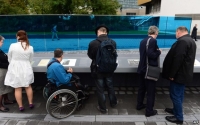A new memorial in Berlin: Forgive but never forget
by Beth
I am blind, and my husband and I have a son who has physical and developmental disabilities. I usually have a lot to say when writing blog posts about disabilities, but when I was asked to write about a new memorial in Berlin, I originally said no.
The memorial commemorates the children and adults with disabilities who were murdered by the Nazis when Hitler was in power, and an Atlantic Monthly article about all this was so disturbing I didn’t want to deal with it. Here’s how the article begins:
In July 1939, Richard and Lina Kretschmar, two farm workers from eastern Germany, wrote to Adolf Hitler to ask for permission to kill their son. Gerhard Kretschmar had been born five months earlier with one arm, one leg, and vision loss. The Kretschmars were loyal Nazis, and “The Monster,” as they referred to Gerhard, was considered both burdensome and incompatible with the pursuit of genetic perfection. Gerhard was killed a few days later at a hospital near his home, likely by lethal injection.
That story makes my stomach turn every time I read it. I know these horrible things happened, but I don’t want to read accounts of them, and I’m not exactly sure I want a memorial erected to remind me of them, either.
When my husband got home from work that evening, I told him how I felt about all this. He listened, and he was understanding. But then he wisely reminded me of a story I’d told him once, about a visit I’d taken to Dachau when I was a 20-year-old exchange student.
I could still see back then, and my visit to the former Nazi concentration camp was my first real confrontation with the war crimes I’d read about in memoirs and history books. I saw where prisoners had been punished for breaking camp rules, where Nazi doctors conducted their “medical experiments” on prisoners, and where American liberators found piles of dead bodies after the war was finally over.
My tour of that concentration camp was sobering, and I think it was something I needed to do to honor the wish of its survivors: “Forgive but never forget.”
As time passes, World War II seems long ago. Today’s younger Germans could decide to try to sweep memories of those terrible times under the rug, but instead they feel a stronger need to remember the horrors that began in their country. I need to remember those horrors, too, even if it makes my stomach turn when I do. I commend Berlin for unveiling this new memorial to innocent victims like baby Gerhard. Forgive but never forget.







